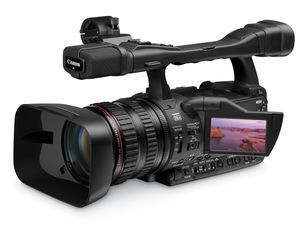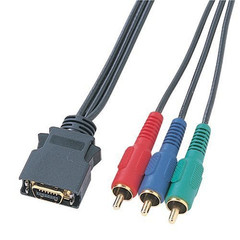Canon XH A1s: Difference between revisions
mNo edit summary |
m (→HD output) |
||
| Line 10: | Line 10: | ||
The camera lacks the usual HDMI output of YSTV's other HD cameras. Instead, it has a somewhat proprietary analogue component connector. The [[w:D-Terminal|D-Terminal]] connector is a common method of component output in Japan, and pins 1-6 are in fact the standard Y/PB/PR outputs with ground. While not usually found on European and American devices, Canon uses this on some of their professional camcorders of the late-2000s - presumably so they can charge £60 for a new breakout cable when you lose the original. Such cables can in fact be imported from Japan for about £10. | The camera lacks the usual HDMI output of YSTV's other HD cameras. Instead, it has a somewhat proprietary analogue component connector. The [[w:D-Terminal|D-Terminal]] connector is a common method of component output in Japan, and pins 1-6 are in fact the standard Y/PB/PR outputs with ground. While not usually found on European and American devices, Canon uses this on some of their professional camcorders of the late-2000s - presumably so they can charge £60 for a new breakout cable when you lose the original. Such cables can in fact be imported from Japan for about £10. | ||
For HD output, the breakout cable could be connected to the connector labeled 'HD/SD Component' (the viewfinder output is SD and dirty). Use the Blackmagic Analogue to SDI converter to change this to | For HD output, the breakout cable could be connected to the connector labeled 'HD/SD Component' (the viewfinder output is SD and dirty). Use the Blackmagic Analogue to SDI converter to change this to an SDI signal, which can then be run through the rest of the vision path. | ||
== External links== | == External links== | ||
*[http://files.canon-europe.com/files/soft32072/Manual/XHG1s_XHA1s_CUG_ENG.pdf User manual] | *[http://files.canon-europe.com/files/soft32072/Manual/XHG1s_XHA1s_CUG_ENG.pdf User manual] | ||
[[Category:Technical]][[Category:Cameras]] | [[Category:Technical]][[Category:Cameras]] | ||
Revision as of 10:59, 8 December 2014
The Canon XH A1s is a former FilmSoc camera, bought by the society sometime in 2009. Following the failure of FilmSoc to re-ratify in 2014, the camera was kept by YUSU for the purposes of filming meetings and events. Like the Sony HVR-HD1000E cameras, it records at 1440x1080i50 (anamorphic) onto HDV tape for capture, and does live video out over a 'proprietary' component connector (HD/SD) or a BNC composite connector (SD).
Due to lack of usage, lack of accessories (no tapes, no charger - both of which we have many of), and the fact that we'd be asking to borrow it a lot anyway, the camera was later given to YSTV to look after. In return, we get to use the camera whenever YUSU don't need it (which is pretty much 99% of the time) - making it a third usable HD camera for pre-recorded shoots. Currently, this is an informal agreement in place between YSTV and Student Activities Officer (and ex-Station Director) Chris Wall.
In December 2014, one of the internal fuses blew when a firewire cable was connected to the camera for capture, causing a short for some reason. Apparently, this is a common problem. The camera is currently unusable, pending replacement of components.
HD output
The camera lacks the usual HDMI output of YSTV's other HD cameras. Instead, it has a somewhat proprietary analogue component connector. The D-Terminal connector is a common method of component output in Japan, and pins 1-6 are in fact the standard Y/PB/PR outputs with ground. While not usually found on European and American devices, Canon uses this on some of their professional camcorders of the late-2000s - presumably so they can charge £60 for a new breakout cable when you lose the original. Such cables can in fact be imported from Japan for about £10.
For HD output, the breakout cable could be connected to the connector labeled 'HD/SD Component' (the viewfinder output is SD and dirty). Use the Blackmagic Analogue to SDI converter to change this to an SDI signal, which can then be run through the rest of the vision path.

